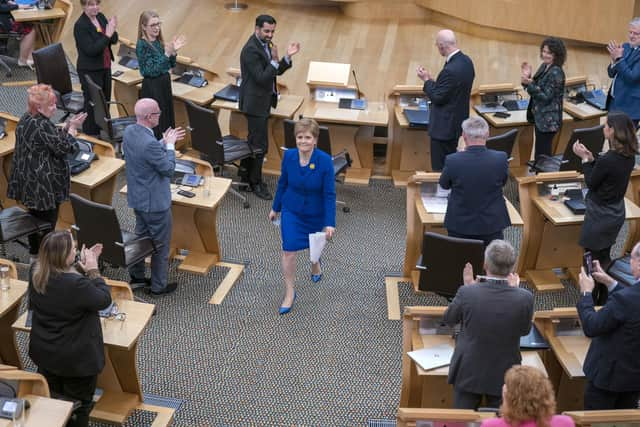SNP leadership: Nicola Sturgeon officially tenders resignation as First Minister to King Charles III
Ms Sturgeon steps down to make way for Humza Yousaf, who was named the new leader of the SNP on Monday after a five-week campaign.
On Twitter, Ms Sturgeon said she had signed her letter of resignation and left Bute House for the final time in the top job.
Advertisement
Hide AdAdvertisement
Hide Ad“Just signed my formal letter of resignation and departed Bute House for the final time,” she said. “Next stop @ScotParl to vote proudly for @HumzaYousaf as Scotland’s sixth First Minister.
“From me – for now – thank you Scotland, for the privilege.”
In an emotional final day at the First Minister’s official residence in Edinburgh, Ms Sturgeon was seen to embrace the household staff who work there, as well as posing for pictures with members of her team.
As she walked down the famed stairs of the building, adorned with pictures of the first ministers who occupied the building previously, a nail could be seen protruding from the wall, ready for the picture of her successor.
Ms Sturgeon’s resignation was followed by confirmation that John Swinney, her deputy in government for the entirety of her tenure, was also stepping away from ministerial politics, and would go to the backbenches with her.


The official tendering of resignation to the King came as Humza Yousaf’s campaign manager said the new SNP leader had the “power to govern” without an election.
Mr Yousaf is expected to be voted into the post of Scottish first minister by MSPs on Tuesday afternoon, becoming the youngest person to hold the position and the first from an ethnic minority background.
Scottish Labour leader Anas Sarwar has called for Mr Yousaf to go to the country in a Holyrood election, claiming he does not have a mandate.
Advertisement
Hide AdAdvertisement
Hide AdRejecting the idea, Neil Gray – Mr Yousaf’s campaign manager and a key supporter – said the new leader already has the “power to govern”.
He told BBC Radio Scotland on Tuesday morning: “The democratically elected MSPs who choose the first minister through a ballot in the Scottish Parliament have that opportunity to do so today.
“This is a different situation than what we faced when Gordon Brown took over from Tony Blair, for instance, where there wasn’t an election or, indeed, the various Conservative leaders who have been elected by the party over the last few years.
“I think Humza has a very clear mandate, I think that will be earned by his election today, and he absolutely has the power to govern going forward.”
Support from the Scottish Greens in Holyrood – pledged in the hours after Mr Yousaf’s victory – is expected to usher him into Bute House with little controversy.
Opposition politicians can put themselves up to become first minister in the Tuesday afternoon session at Holyrood, but they face long odds to win the contest.
Scottish Conservative leader Douglas Ross will be his party’s nominee, and he told Good Morning Scotland he would focus on the NHS, the cost-of-living crisis, the economy and education – while claiming Mr Yousaf has the “wrong priorities for Scotland”.
One of the first big tests for Mr Yousaf is his approach to gender reforms passed by Holyrood, but blocked by the UK Government in January.
Advertisement
Hide AdAdvertisement
Hide AdHe has repeatedly said he would challenge that move in court and seek to put the controversial Bill on to the statute book – although in the latter phases of the SNP leadership campaign he said he would not push ahead with a challenge if legal advice said it could not be won.
SNP Westminster leader Stephen Flynn, speaking to Sky News, described the move to block the Gender Recognition Reform (Scotland) Bill as a “democratic blocker”, while his deputy Mhairi Black said the legislation was “not controversial”, claiming “a lot of the criticisms of it, I think, are based on misinformation or people not having an idea of what the full picture is”.
She added: “What this is about is pointing out that Westminster can’t just keep riding roughshod over the Scottish Parliament.
“This is something that is completely within the devolved capabilities and yet the UK Government and a Tory Government we have not voted for is telling us that they can dictate what laws we can make in Scotland, and I don’t think that is right.”
Mr Gray, who was singled out for thanks by Mr Yousaf in his acceptance speech and described as his “corner man”, also told Times Radio: “I think there is an important principle at stake here.
“Of course he is going to listen to the legal advice – he has to do that – but there is an important principle at stake which is about the democracy and the democratic mandate given to the Scottish Parliament that must be defended.
“A two-thirds majority passed the Gender Recognition Bill in the Scottish Parliament. We must defend Scottish democracy and devolution. Otherwise, what is the point?”
Comments
Want to join the conversation? Please or to comment on this article.